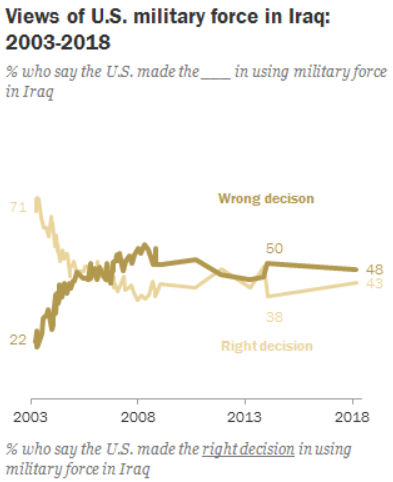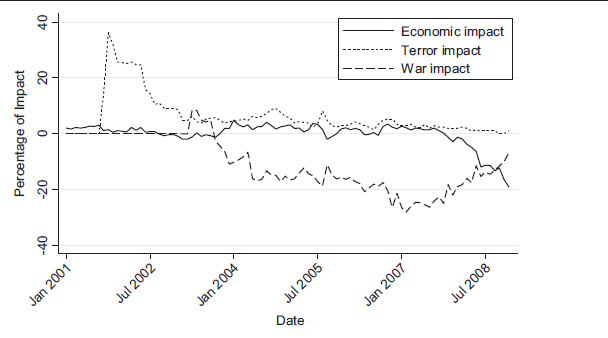By Jeff Soplop Bombing for Votes: Public opinion shifts during the Iraq war and implications for future conflicts Despite the recent summit in Singapore, which mostly made for good television and little substance, North Korea appears to be quickly ignoring any promises–whether implicit, explicit, or imagined–made to President Trump to dismantle its nuclear program. In Iran, Trump’s decision to withdraw from the six-party nuclear deal and the re-imposition of sanctions has created a possibility that Iran will resume pursuing a nuclear weapon of its own. The common thread between Iran and North Korea, of course, is the continued march of nuclear proliferation and, with it, an elevated chance of the US initiating armed conflict as a means to slow or stop such
Topics:
Dan Crawford considers the following as important: politics, US/Global Economics
This could be interesting, too:
Robert Skidelsky writes Lord Skidelsky to ask His Majesty’s Government what is their policy with regard to the Ukraine war following the new policy of the government of the United States of America.
Joel Eissenberg writes No Invading Allies Act
Ken Melvin writes A Developed Taste
Bill Haskell writes The North American Automobile Industry Waits for Trump and the Gov. to Act
by Jeff Soplop
Bombing for Votes: Public opinion shifts during the Iraq war and implications for future conflicts
Despite the recent summit in Singapore, which mostly made for good television and little substance, North Korea appears to be quickly ignoring any promises–whether implicit, explicit, or imagined–made to President Trump to dismantle its nuclear program. In Iran, Trump’s decision to withdraw from the six-party nuclear deal and the re-imposition of sanctions has created a possibility that Iran will resume pursuing a nuclear weapon of its own. The common thread between Iran and North Korea, of course, is the continued march of nuclear proliferation and, with it, an elevated chance of the US initiating armed conflict as a means to slow or stop such proliferation.
In this post, I’m not going to speculate how probable armed conflict with either Iran or North Korea might be (although I might take a shot at it in a future post). Instead, I’m interested in what the public reaction to such a conflict would be and how it would affect support for Trump, especially in the run up to an election.
To estimate public reaction, it’s useful to consider how the public mood shifted throughout the course of the Iraq war. Even 15 years after it started, the Iraq war continues to be divisive. As shown in the chart below from Pew Research, when the Iraq invasion was first launched in March, 2003 a large majority of the country supported it as the “right decision.” By early 2005, however, that support eroded and has remained relatively stable since then.
Similar to the start of the Iraq war, other research has shown a public “rally around the flag” effect at the outset of military action. One study, for example, looked at 41 US foreign policy crises and found the average effect was a boost of 1.4 percentage points to the president’s approval rating. But, when the military action was large enough to merit front-page coverage by the New York Times, that effect jumped by another 8 percentage points, representing a significant lift for any president.
Considering these examples, a president with a low approval rating might be tempted to initiate an armed conflict in the run-up to an election as a way to shore up public support, at least temporarily. Given Trump’s lack of scruples about any action that might in some way benefit him, such a scenario is within the realm of possibility for the 2018 midterm elections or the 2020 presidential election.
Research on the influence of major events on presidential approval ratings, however, shows that the public reaction to armed conflict cannot be taken for granted. A research paper recently published in Presidential Studies Quarterly looked at how approval ratings fluctuated over the course of George W. Bush’s presidency and analyzed the causes of those fluctuations. The authors reasoned that Bush’s presidency was ideal for studying presidential support because it was so eventful–the September 11th terrorist attacks happened during his first year in office, then Bush initiated large-scale invasions of Afghanistan and Iraq, and the Great Recession started toward the end of his presidency.
To examine factors that influenced Bush’s public support, they modeled his approval rating based on environmental variables (unemployment, inflation, consumer confidence, battle deaths), major event variables (9/11 attacks, Iraq invasion, market crash), and ordinary event variables (positive and negative news coverage of international and domestic events). The environmental variables were weighted based on Gallup’s monthly Most Important Problem poll, which allows the model to consider the importance of these variables’ salience in the public mindset. (For those who are interested, they used a Newey-West estimator to build the model to account for heteroscedasticity and autocorrelation in the errors.)
After creating the model, they grouped the independent variables into three categories: economic, war, and terror. These categories allowed the authors to examine the impact of each on Bush’s approval rating over the course of his presidency, shown in the chart below.
The results in the chart provide interesting insights that challenge some conventional wisdom. Economic status is often considered one of the most important factors in presidential approval but–according to this study, at least–for Bush, the economy was almost a non-factor until the very end of his presidency when the Great Recession started. The 9/11 terrorist attacks, and Bush’s response to them, including bombing Afghanistan, provided an initially huge boost to his approval. But that jump faded almost entirely within a year. The beginning of the Iraq war, by contrast, provided only a very small, short-term boost to Bush’s approval ratings, which quickly turned into a large negative that continued to weigh down his ratings for the remainder of his term. By examining the model variables, it’s clear that troop casualty reports had a particularly significant negative impact within the war category.
Based on these results, the study’s authors concluded that it is the salience of events that matters as much or more than the events themselves. When 9/11 happened, people wanted security and rewarded Bush for taking decisive action that made them feel safer. When the Iraq war started, the effects of war weariness kicked in fairly quickly and people wanted fewer causalities and peace. When the Great Recession began, people forgot about everything else and looked to their own economic prospects.
With those lessons in mind, initiating an armed conflict with Iran or North Korea would be a high-risk approach to boosting public support in the run-up to an election. Both countries have powerful militaries and any conflict could quickly lead to high casualty numbers. While no military action would be risk free, an engineered conflict with a target that could be attacked with minimal threat to US troops, such as Syria or Yemen, could induce a short-term rallying effect. As elections approach later this year and in 2020, keep your eyes on those and other “soft” targets to see if the president tries to bomb his way to his desired outcome.


